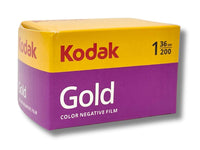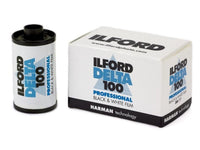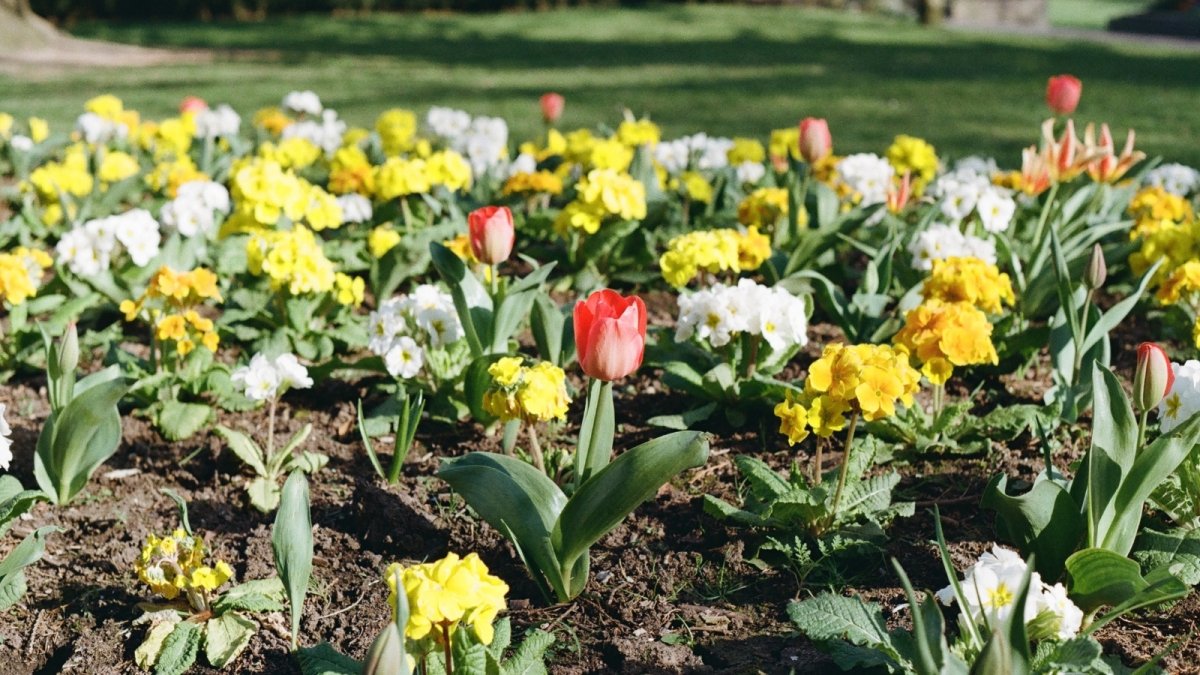
8 Easy Tips for Capturing Springtime Beauty with Film Photography
By Karen Freer
Spring is the perfect season for photography, with its spectacular array of vibrant blooms and lush landscapes. Film photography can capture its beauty in a unique way, with bold colours and crystal-clear resolution. Here are eight simple tips to get you started on your spring film photography journey.
If you've already mastered the basics and fancy a bit more of a challenge, head to this blog.
Select Suitable Film Stock
Selecting the right film stock for springtime photography is essential for capturing vibrant colours and pleasing exposures. A high ISO film such as 400-800 will generally be suitable for outdoor shooting, or a slower ISO 100 film can be used in bright daylight. Choose a colour of film that complements the scene, whether it’s classic black and white or vivid Kodak Ektachrome 100 film.
Here are a few standout film stocks - most available in both 35mm and 120 formats - that we love for spring shooting. But don’t just take our word for it, our film community swears by them too!
Kodak Gold 200
A staple for a reason, Kodak Gold 200 is a best-seller that consistently delivers. This versatile colour film offers wide exposure latitude, making it a reliable choice in everything from bright sunlight to softer, low-light scenes. Its warm, vintage tones give photos that classic nostalgic feel we all love.
The proof is in the praise - like this review from Ruth A: "Love this film stock. Gives a great warmth and depth to photos that's super versatile. Great for beginners as I've always found the tones it produces really reliable."

(c) Ruth A | Kodak Gold 200 35mm
Candido 400
If you're looking to try something new with unique colour tones and vibrant character, then the Candido range is one for you! Its ISO 400 film performs beautifully in both daylight and low light, making it a versatile addition to your everyday kit. Give it plenty of light and colour, and it’ll reward you with a unique, vintage look.
Nathan Harlow had this to say in his review: "I've enjoyed shooting this stock when I want something a bit creative and vibey. Some halations but not too much, very vivid colours, darkens skies slightly and works well in limited light."
Ilford Delta 100
Ilford’s Delta range is known for delivering professional-quality black and white film, and Delta 100 is no exception. With its slower speed, it produces incredibly sharp images, fine grain, and bold contrast - perfect for capturing the drama of light and shadow.
Photographer Matthew Tsang shares his thoughts on shooting with it: "An amazing low ISO B&W film that excels in bright, sunny conditions. Has amazing contrast, detail, and fine grain. Very affordable for a professional film."
(c) Matthew Tsang | Ilford Delta 100 35mm
Kodak Ektar 100
A must-have for capturing the colours of spring, Kodak Ektar delivers ultra-vibrant, crisp, and vivid results you won’t forget. Its beauty is undeniable. With rich, true-to-life tones, it’s a solid choice for all kinds of spring photography - whether you’re shooting sweeping landscapes, intimate portraits, or detailed still life.
Film photographer Joss Hollingworth put it best: "One of the most beautiful colour stocks I’ve shot, I’ll be shooting landscapes on Ektar from now on. The colours it captures aren’t just strong, they’re beautiful. This isn’t the kind of saturation you get from turning up the saturation in a photo editor. The colours feel natural. I also found it surprisingly forgiving in terms of exposure."
CineStill 400D
While CineStill is best known for its iconic 800T night film, its daylight offerings - 400D and 50D - bring the same cinematic tones and soft colour palette, perfect for capturing the subtle hues of spring. With the flexibility to rate from 200 to 800, and even push to 3200, it’s a versatile go-to for those unpredictable spring days.
"The dynamic range of this film makes it so versatile and looks great in full on sunshine or low light conditions. I love the colour tones also, which give a real cinematic looks to the pictures," said CineStill 400D shooter Max Holley.
Check out our full collection of spring films here.
Embrace Soft Light
Spring often brings with it soft, diffused light that can be perfect for film photography. Look for ways to incorporate this gentle light into your images, such as by shooting during the early morning or late afternoon.
Don't forget to make the most of those stunning spring sunrises and sunsets. Your photos will thank you! Have a look at these shots of a Turkish sunrise captured by Amy on SantaColor 100 and Kodak Ektachrome 100 35mm films. Both are beautiful colour films which are great for capturing spring colours, with each delivering unique results!

(c) Karen Freer | Pentax 645 | Kodak Portra 400 120 Film
Experiment with Colour
Spring is a season of vibrant colours, so don't be afraid to experiment with different film stocks to capture the hues of the season. Consider using slide film to capture the brilliant colours of spring flowers or try experimenting with expired film for a vintage look.
If you're curious about shooting expired film, check out our blog with Miles - aka Expired Film Club - who’s turned capturing sports on expired rolls into his full-time gig!
 (c) Karen Freer | Pentax ME Super | Kodak Gold 35mm Film
(c) Karen Freer | Pentax ME Super | Kodak Gold 35mm Film
Look for New Beginnings
Spring is a time of renewal, so look for ways to capture the beauty of new beginnings. Whether it's the first buds on the trees, the emergence of baby animals, or the return of migratory birds, there are plenty of opportunities to capture the essence of the season.
Shooting with a theme in mind is a great way to break out of a creative rut—once you start looking for something specific, you’ll begin to see it everywhere, and it might just spark your next mini photography project. If you're feeling uninspired and need a hand with some ideas to get you started, why not create a bingo card to keep track of your creative projects throughout the year?
 (c) Paul McKay | Lomochrome Turquoise 35mm Film for some more tips on shooting with Lomo Turquoise check out our blog here
(c) Paul McKay | Lomochrome Turquoise 35mm Film for some more tips on shooting with Lomo Turquoise check out our blog here
Play with Depth of Field
Spring is a time when everything is coming to life, so consider playing with depth of field to capture the intricate details of the season. Use a wide aperture to create a shallow depth of field and blur the background, drawing attention to your subject. If you're unsure how to do this, you can find more information around the theory of photography - such as the relationship between aperture, ISO and shutter speed - in this blog.
 (c) Karen Freer | Minolta Dynax 7 | Kodak Portra 800 35mm Film
(c) Karen Freer | Minolta Dynax 7 | Kodak Portra 800 35mm Film
Take Advantage of the Weather
Spring weather can be unpredictable, but don't let that stop you from shooting. Rainy days can create beautiful reflections and moody atmospheres, while overcast days can be perfect for capturing the soft, diffused light of the season. It's also a good excuse to switch to B&W films: check out our article on the best black and white films for some inspiration!
If you do find yourself stuck with unfavourable weather conditions and need to head inside, don't fret! You can get creative by learning how to shoot in low-light conditions.
 (c) Karen Freer | Minolta Dynax 7 | Kodak Portra 800 35mm Film
(c) Karen Freer | Minolta Dynax 7 | Kodak Portra 800 35mm Film
Don't Forget the Details
Spring is a season of intricate details, so don't forget to look for the little things that make the season special. From the delicate petals of a flower to the intricate patterns on a butterfly's wings, there are plenty of small details that can make for stunning images.
 (c) Karen Freer | Minolta Dynax 7 | Kodak Portra 800 35mm Film
(c) Karen Freer | Minolta Dynax 7 | Kodak Portra 800 35mm Film
 (c) Karen Freer | Minolta Dynax 7 | Kodak Portra 800 35mm Film
(c) Karen Freer | Minolta Dynax 7 | Kodak Portra 800 35mm Film
Try Some Creative Techniques with Lens Filters or Double Exposures
As long as you understand how filters work, experiment with bold colours to really make your springtime photos stand out. Try using colour filters over the film lens to give life and depth to a scene or a subject, while creating some stunning abstract effects without any digital post-production. You can also try double exposures – two or even more film frames layered one on top of the other – to create an ethereal look that replicates your own personal understanding of this season’s beauty!
 (c) Karen Freer | Minolta Dynax 7 | Kodak ColorPlus 35mm Film
(c) Karen Freer | Minolta Dynax 7 | Kodak ColorPlus 35mm Film
The photo above was taken using a Hoya Multivision 5 filter, it will give you a different effect depending on how far away you are from the subject.
 (c) Karen Freer | Minolta Dynax 7 | Kodak Portra 800 35mm Film
(c) Karen Freer | Minolta Dynax 7 | Kodak Portra 800 35mm Film
The photo above was taken using the Minolta's built in double exposure feature. Your cameras features will dictate how you go about taking a double exposure. In some cases you may need to wind the film backwards to take a second photo over the first exposure of that frame. Check out this demo from Paul on how to do it on the Pentax 17, using a method that also applies to most film cameras.
Some cameras like the Holga or older TLR and folding cameras will allow you to just keep pressing the shutter for infinity, and a lot of people find themselves getting accidental double exposures this way.
 (c) Karen Freer | Pentax ME Super | Kodak Gold 35mm Film
(c) Karen Freer | Pentax ME Super | Kodak Gold 35mm Film
The photo above was taken using a Cokin Violet spot filter. The aperture setting will change the sharpness of the hole’s edges; the smaller the aperture, the sharper the hole’s edges will be, and vice-versa. In this example you can't really see the hole's edges at all.
Conclusion: Capturing Springtime Beauty with Film Photography
Spring is a season of renewal and rejuvenation, and film photography offers a unique and beautiful way to capture its beauty. From the soft, diffused light to the vibrant colours and intricate details, there are endless opportunities for film photographers to create stunning images that truly capture the essence of the season.
By embracing the soft light of spring, experimenting with colour and depth of field, and paying attention to the details, film photographers can create images that are truly breathtaking. So grab your camera, load up some film, and get ready to capture the magic of springtime through the lens of your camera.
 (c) Karen Freer | Pentax ME Super | Nation Photo 35mm Film
(c) Karen Freer | Pentax ME Super | Nation Photo 35mm Film
Ready to dive in?
Keep Reading
View all
Analogue Adventures: "Halation Harry" in Oslo 😅
Enjoy some beautiful imagery, powerful inspiration, and amazing halation courtesy of Harry Ma and Cinestill 800T...
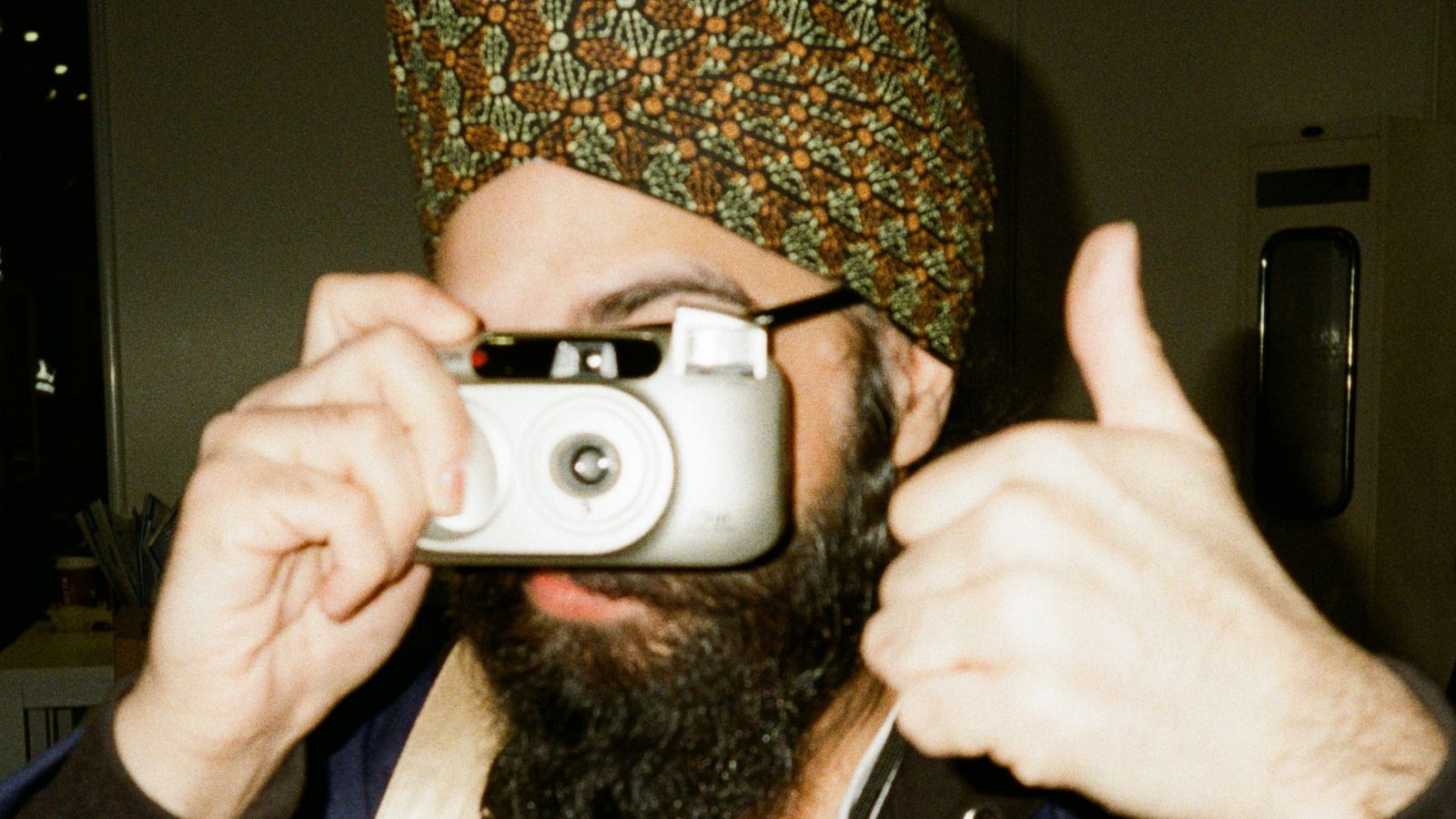
The new series: Analogue Adventures
Submit your personal Analogue Adventure - and if chosen we will work together to turn your experience into an article on our site and social posts on our account for posting with the analogue community!
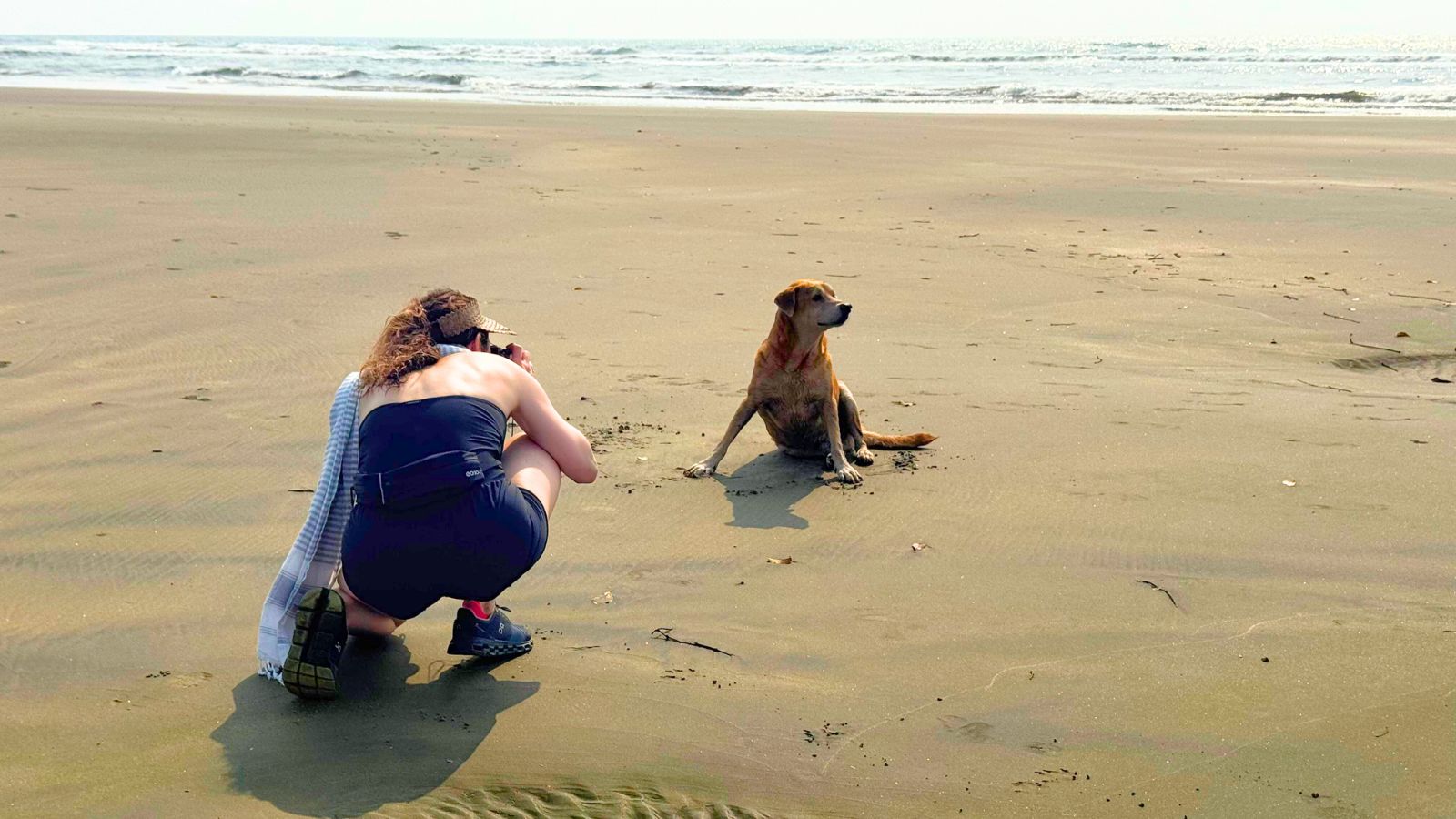
Analogue Adventures: Nic in India
The first in our new series of community articles, find out how film photographer Nic got on with a Pentax 17 camera in India!
Subscribe to our newsletter 💌
Sign up for our newsletter to stay up to date on film photography news, sales and events:
Free Tracked Shipping
On all UK orders over £50
Passion For Film
An unbeatable range and an on-site lab
Our Customers Trust Us
Thousands of independent 5* reviews
All Deliveries are Carbon Neutral
Independently audited and verified by Planet
- Opens in a new window.




